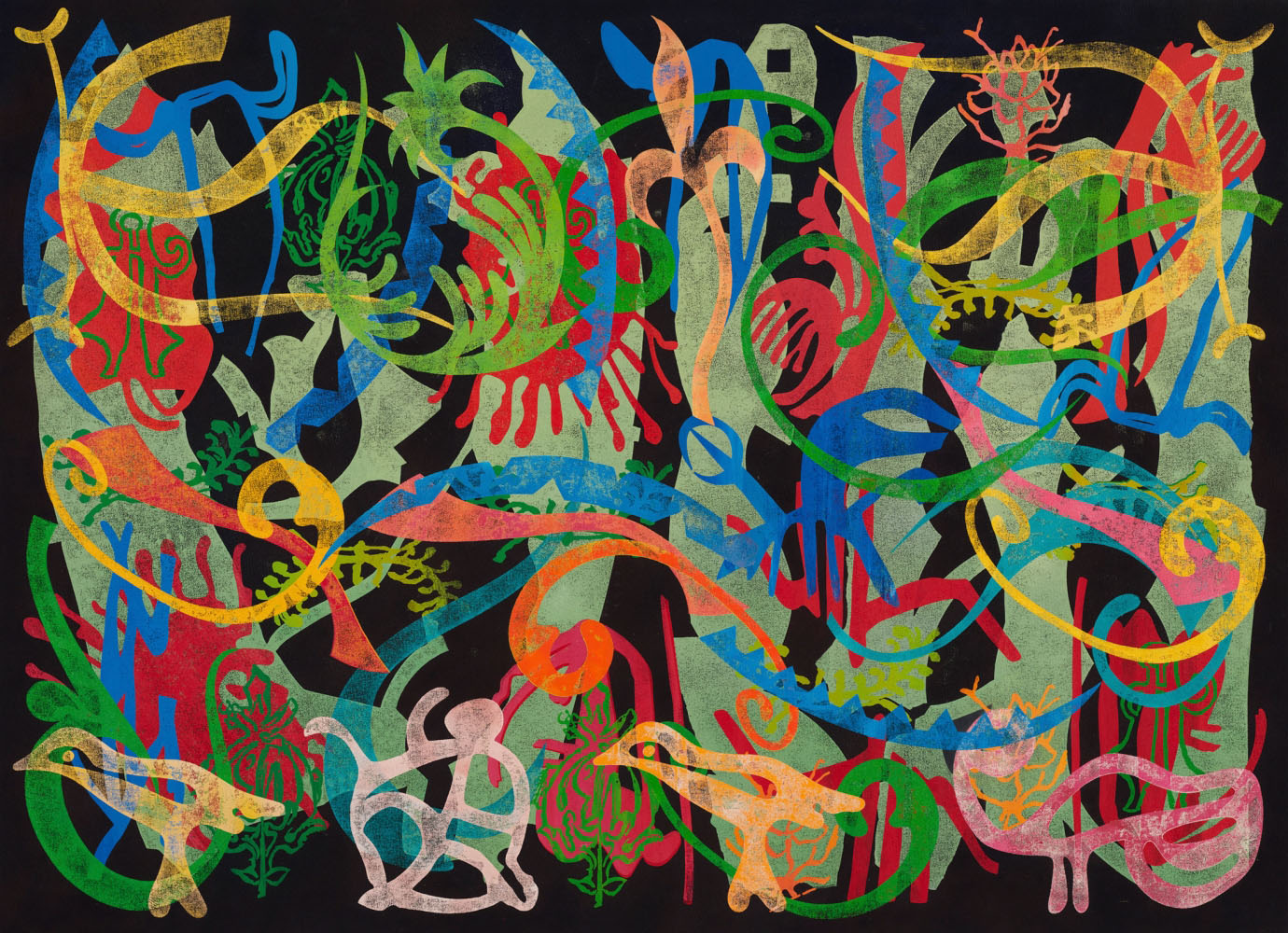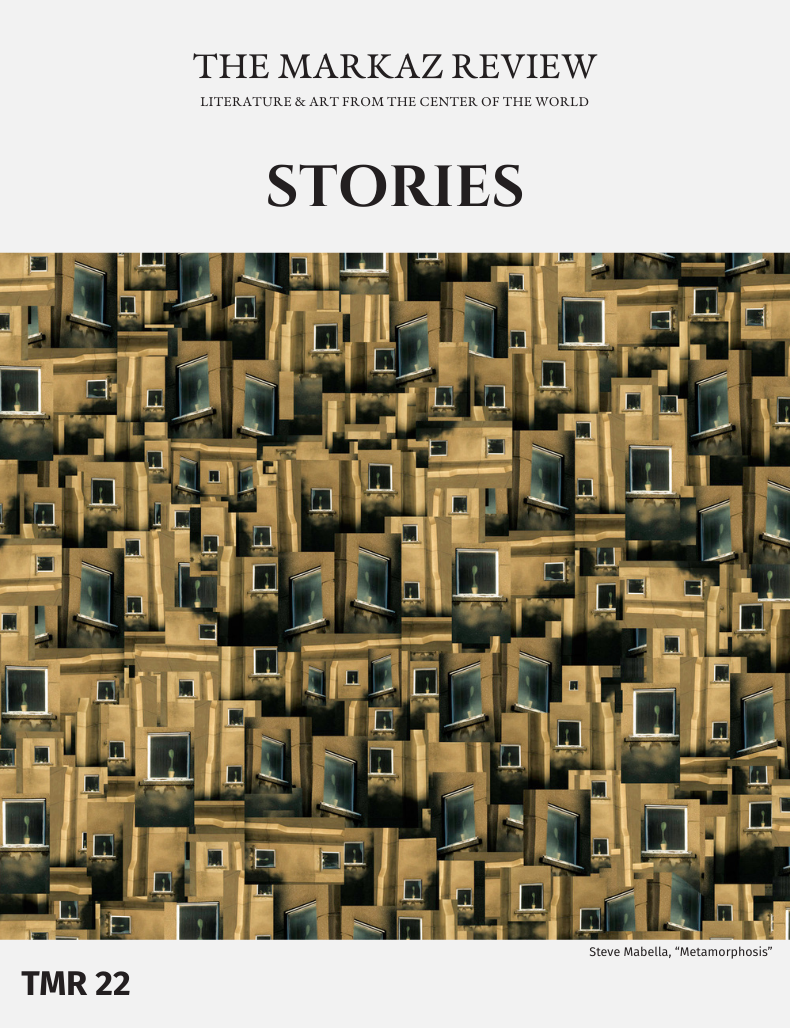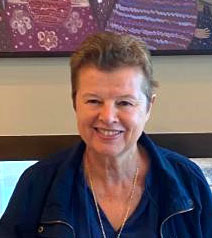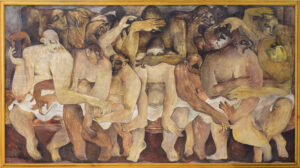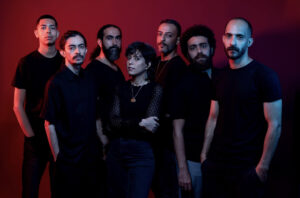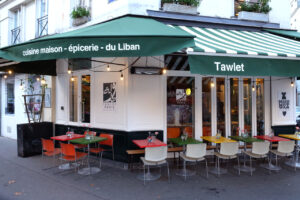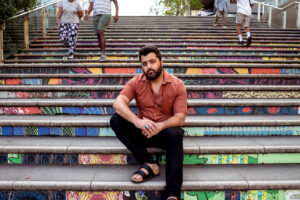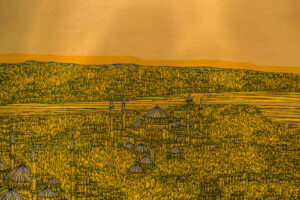A wayward daughter leaves Boston to spend a summer back home in Cairo, where she observes the decline of her once prominent family.
Whatever greatness could have been ascribed to the El Sha’er family at one time — and clearly, to rise above the dusty poverty of Egypt required some talent — was no longer apparent. On the contrary, the family legacy that had been passed down from older generations had been abandoned or cheapened, like the French boudoir table blurred by so many coats of paint, its hinges rendered immobile; or the chipped portrait of a handsome, slender relative at the turn of the century, with silk cravat and elegant fez, his pale face staring out of the darkness. Perhaps, as the Arab philosopher maintained, a family’s downfall is inevitable.
The El Sha’ers had made their fortunes as merchants and lawyers. They claimed the requisite legitimacies: descent from one of the Islamic caliphs, Turkish blood. They rose to prominence as ministers under kings. Whenever you visited the El Sha’ers, in this apartment or that, at the beach or in the country, their things sat around in disrepair gathering dust. They fought each other tooth and claw for land and objects, even in front of the servants, who mumbled audibly that money only caused trouble between people.
One elderly Sha’er, recently returned from the United States after three decades as an insurance executive, bought an airy apartment overlooking the Nile. He had long since lost his American wife, such that the closest relative left to him was his daughter, Nadia, who was in graduate school in Boston. Being a dutiful son, he installed his mother in the flat with him.
Adnan had returned to Egypt to retire, to sit on his balcony overlooking the Nile with his childhood friends, drinking whiskey or beer, nibbling on cucumbers and carrots. They would talk about the good old days before the 1952 revolution, and before nationalization, with such fresh enthusiasm the events might have happened yesterday. One man had ridden in the motorcade of the king, another had joined in his pigeon shooting. Life was elegant in those days.
When Adnan wasn’t on the balcony, or reading in the study, he was at the club, walking around the race course and chatting with his friends under the jacaranda trees. Through most of it he fingered his sibha, a habit he had only indulged in, in private, abroad.
Adnan had retired mentally long before he had retired physically. The new bridge spanning the club playing fields, the brazen behavior of the youth, the gaudy fashions of the club members left little imprint on his perceptions, were powerless to offend his sense of propriety, nor even moved him to expressions of impotent annoyance.
Adnan’s ability to retreat from modern Cairo was helped by his home environment. The flat was filled with his mother’s graceless furniture: a carelessly gathered hodgepodge of English Victorian, French Art Deco and badly copied Louis XVth. Red velvet curtains were hung to shut out the sun and dust, the same material that covered most of the furniture. Adnan’s quarters were separate from his mother’s, so he was not bothered by her visitors, most of them supplicant, poorer relatives; or her screaming fights with the servants; or the occasional squawk from a scrawny chicken being weighed on scales at her feet.
In the early summer of 1980, Adnan sat in his brown study, sipping a cup of Arabic coffee out of a chipped demitasse cup and reading a letter from Nadia. She was coming to Cairo for the entire summer, not just the usual two weeks. His daughter was in need of a period of recuperation after a year of serious study and serious drinking. Nadia having been born to him at an advanced age, Adnan had developed a relationship of camaraderie and tolerated her speaking openly to him. Still, he felt a twinge of worry at her coming. He enjoyed the apathy in which he existed, and which was shared by most of the populace that year. She tended to stir the air when she passed into a room. He wondered how she would fit against a background of somber furniture and velvet plush. Still, he also looked forward to her arrival, to having her sit late with him on the breezy balcony watching the city lights, laughing at the comic plays broadcast on television.
When he told his mother over tea that afternoon (she had the curious habit of always insisting that he eat a pastry with his tea), she suggested that they once again look for a husband for her. Adnan: “You know, mother, she has a Western mentality. In Amreeka girls choose their own husbands, after a long period of knowing them.”
“Nevertheless, there is nothing wrong if she falls in love with an Egyptian and marries him. When she was going to the American University at Cairo she had many Egyptian boys as friends. At any rate I want her near me in Cairo. We could furnish her an apartment, with everything … a refrigerator, a washing machine … and we could buy her a car. She could work if she wants …”
“Mother, don’t start again. You know these things wouldn’t work for Nadia. She has her own mentality.”
“That’s your fault, Adnan. You married an American.”
Adnan calmly stood up and left the room. As he walked through the silent, dark apartment, his bedroom slippers padding on Persian carpets, he realized he no longer had the energy to get into any of these facile arguments … about marrying outside his culture, leaving his family and country. None of that mattered any more. They were no longer issues. He remembered why he had had to leave. And now, when he opened the door to the balcony and looked at the river, most beautiful before sunset, under diffused light, with a few scattered felucca sails billowing, he knew why he had returned. It was for no logical reason … just that his skin did not grate against the air here and deeply buried memories rendered him familiar with most of what he now saw and heard. The heat and the dust of this place had been woven into the fabric of his body in his youth so that he felt comfortable nowhere else.
Adnan thanked God for the view and for having rid him of his half formed ambitions, his myriad illusions. And he thanked God for having spared him the misfortunes that had befallen Egypt in the last decades.
Nadia sauntered into Cairo Airport late one June night, in jeans, a loose overhanging shirt, and sneakers, tossing her head to get the bangs out of her eyes. She barely recognized her father, standing near some soldiers with olive complexions, dark eyes and jungle green fatigues. Military uniforms used to be desert beige but then someone had decided that the locus of military activities would change. Policemen, who would one day quarrel with their military counterparts, wore summer whites.
Nadia had never felt comfortable in the ramshackle chaos and milling uniforms of the airport reception halls. Her father’s tired smile did little to reassure her. The frailty she sensed in him prompted her to refuse his offer to carry her shoulder bag, her only baggage. As he drove her through Heliopolis, asking her questions about school, she fought back her tugging doubts about his possible mortality. When they reached the square near the Sheraton and the young men weaving through the cars selling flower garlands, she asked for a string of jasmine. Adnan bargained with a young man, all dressed in white and holding wreathes of blossoms, to one third his asking price and handed the jasmine gingerly to Nadia. She cupped it in her hands and inhaled the reassuring smell. One of her earliest memories was of a string of blossoms hanging from a car mirror.
Nadia awoke the next morning to street and construction sounds. It was already blistering, the sun high in the sky, and the household had been awake for hours. Adnan was at the other end of the flat, sitting on the balcony drinking a cup of Nescafé. A strong breeze tugged at the newspaper he was reading. Nadia walked onto the balcony: “This place is like a morgue,” she said.
Adnan: “Good morning Nadia, what would you like for breakfast.”
Nadia: “Foul with white cheese and olive oil, please, and Nescafé.”
“Ya Mohammed,” Adnan called to a young man. Wearing green trousers, fitted white shirt and platform-heeled shoes, Mohammed appeared, smiling. He greeted Nadia with a deep handshake and more smiles. Adnan told him what Nadia wanted and he left for the kitchen.
Nadia: “What kind of salary do you give that man?”
“Officially, he’s paid thirty pounds a month, but I give him an extra fifteen behind your grandmother’s back.”
“Is she still as bad with the servants as she used to be?”
“I don’t know. I don’t think so. How are you? How are you feeling — tired?”
Nadia squinted to look over the brilliant surface of the water. “No.” She noticed buildings under construction everywhere and asked her father about them. They were mostly hotels.
“Is the Carlton still a whorehouse?”
“They’ve made some changes at the Hilton … very nice …”
Nadia’s restless mind rebelled at seeing Egypt through her father’s eyes. She had resolved to feel the country’s pulse this summer, not look at it in terms of new Cairene hotels or imports in the shops. If she had any responsibility to Egypt, it was that, to determine its mood. She expected to sense that mood, the almost tangible frustration level, from the city streets — surely not from the countryside, which was another world after all, another age. It wasn’t true, Nadia deliberated silently, that the Egyptian peasants had always accepted everything and endured. There had been rebellions, armed insurrections. It seemed to Nadia that the countryside was always receding behind a shimmering hot veil that blurred one’s vision and clogged one’s hearing.
Adnan interrupted her thoughts: “Your gramma is anxious to see you.”
“I’m anxious to see her,” Nadia replied, wanting to seem polite.
“She has become a little hard of hearing, so you’ll have to speak loudly to her.”
“Why doesn’t she get a hearing aid?”
“She doesn’t want one.”
“Well, how is her health?”
“Better. Her rheumatism is still bad but she didn’t suffer as much this winter as last. I bought her a new car, a Fiat, because her old one kept breaking down. Without a car she has no mobility.”
For as long as Nadia could remember, her grandmother had had no mobility. She had always known her as overweight and slow moving, shuffling when she walked. But with the years her legs had gotten worse, with poor circulation, pain in the knees, forcing her to bend over and use a cane. Nadia had blamed this on her grandmother’s fondness for starchy foods, which had rendered her overweight since her early widowhood. She was convinced that eating had been her main pleasure in life.
Nadia had barely finished her breakfast of fava beans and white cheese when Mohammed appeared. “Ya Sit Hanem, your grandmother is asking you to come to her room.” This with a smile and a bow. Nadia knew that she’d get a long, close hug, like being pulled into a sponge, as her mother used to say.
Nadia found her grandmother sitting upright on the edge of her bed in front of a small, French boudoir table. On the table were a mirror and brush, lemon cologne, a worn novella and masses of keys. When she was a child Nadia would come into her grandmother’s room to find her opening and inspecting closets, bureau drawers and steel boxes. Nadia was never interested in their contents. As far as she could see, these locked treasures consisted of bolts of cloth, embroidered linen, plastic combs, sequined coin purses, bottles of perfume that would eventually lose their scent.
Her grandmother looked up at her with a smile that was sincere if a bit distracted. She had cut her hair short and no longer bothered to dye it black. She had also acquired a pair of glasses. Nadia bent down to be hugged.
“I am very, very happy to see you. This time you will stay longer. Your father told me you will live with us now.”
“No, gramma, I have to go back to Amreeka to finish my degree.”
“What degree? You’ve already finished one degree. When you were asked in marriage four years ago we explained that you had two more years to finish your degree. Now you are working on another degree? Why do you need all these degrees?”
“I need them to teach, gramma. Anyway, you didn’t encourage that marriage. Now, I’m in love with someone in Amreeka,” she lied.
Nadia sat in a wide bamboo chair facing her grandmother. The old woman gave two resounding claps, upon which a spare, middle age woman in a soiled and faded cotton shift and cotton scarf tightly tying back her hair tentatively poked her head around the door. She didn’t smile. Nadia didn’t recognize her.
“Sharshira, bring us coffee.” To Nadia: “Do you want some ice cream?”
“No thank you, I just had breakfast.”
“How about some pastry, baklava?”
“No thank you, I had a heavy breakfast.”
Her grandmother dismissed the woman with a lugubrious wave of the hand and a “go bring two coffees and two plates and two knives.” She then turned to a little cabinet at her side, fiddled with some keys until she found the one that worked, and brought out a plate of unappetizing fruit. Nadia found this new habit vaguely worrisome.
After half an hour of shouting answers to her grandmother’s questions, mostly about this fictional character in Amreeka (how many houses does he have, how many cars, what kind … that proves nothing) Nadia pleaded jet lag and the need for a nap. Her conversation with her grandmother had deteriorated in the last few years. They used to chat … easily. They had both been younger then. When she wanted to go traveling her grandmother supported her, against everyone, particularly the male members of the family. She gave Nadia the keys to her flat in Alexandria. She offered her cigarettes in public, to the consternation of her father. She even financed and organized a party for Nadia at the family farm, and moved her hulking shape there for the day, sitting on a straight backed chair in a closed courtyard while Nadia’s friends moved about the lawn.
In earlier times Nadia used to love to sit and listen to her grandmother talk about the past. Her estranged father had sent her a piano when she was made to quit school at puberty … her husband had been kind … Adnan’s Saudi friend had treated her royally when she went to perform the pilgrimage … Nadia knew what was essential about her grandmother, which was never alluded to: that she had always wielded power over the family, through her money and force of character.
Nadia didn’t care, since she didn’t need her money. Relatives used to be jealous of Nadia’s relationship with her grandmother and couldn’t understand it. After all, Nadia was unmannered, ingenuous and a mere female. Her grandmother chose Nadia to accompany her on official outings — a wedding in the mansion of a family from Mansoura, her visit to the wife of an imprisoned minister. On these occasions Nadia could barely contain her impatience with the formalistic, empty chatter. When men asked for Nadia’s hand in marriage as a result of these public forays, she and her grandmother use to sit and giggle at each overture.
Whatever comfort and camaraderie Nadia had provided her grandmother for a short time would not endure during her last years. While Nadia was away at graduate school her grandmother fell sick several times. She then consented to live with her son. Her hearing weakened. She yelled at the servants more. When she visited, Nadia saw at first hand how relatives started visiting more frequently, sometimes stopping in the kitchen to help themselves to fruit in the refrigerator. If Nadia’s things disappeared from her room, she didn’t know if it was because of the servants, the relatives or because her grandmother had locked it away for safekeeping. Her father would admit to none of this, even if he noticed it.
Nadia began to feel a foreboding when she visited. She knew that people were trying to marry her father off, marry her off, and convince him to adopt a son and heir. Even her grandmother started encouraging her to marry, so that she would stay in Egypt. Nadia saw the deterioration of the city mirrored in her family. How could she justify this loss of faith in her Egyptian heritage, which had once seemed so glorious, this dread she felt as witness of decline?
Nadia’s late morning slumber was interrupted by a knock. Mohammed was apologetic behind the door: “Would Sit Hanem like to join her father and grandmother for lunch?” Nadia got up, frowning because of a headache, blaming herself for sleeping in the heat. She washed her face, brushed her hair, took two aspirin and walked to the dining room. The dining room was dark, the curtains drawn, an air conditioner whirring. The three of them took up one quarter of the table. Mohammed served. There wasn’t much conversation while they were eating. Roast chicken, mouloukhiya, rice and salad were served on unmatched crockery, parts of elegant sets long since decimated. Nadia wouldn’t look up from her plate. She now avoided the sight of her grandmother eating — the slurping of the soup, the dripping of shiny liquids down the chin, the masticating of the bread. Nadia wondered if she looked like that, and why was it customary for people to eat together, in company. Why wasn’t eating one of the private functions?
Adnan: “How are you feeling Nadia? Still tired?”
“No, I’m all right. I must be jet lagging.”
“Ustaz Mounir called. He’s coming to see you tonight.”
“Oh good.” Ustaz Mounir was her old oud teacher. He used to give her lessons years ago and they had remained friends.
Adnan: “Your grandmother thought that you would like to go to the farm this afternoon. You’ll be back in time for Ustaz Mounir.”
“Yes, I would.”
“We’ll go at five. The driver will be here then.”
Grandmother: “Nadia, have some dessert, some konafa.”
“No thank you, gramma. I’m no longer hungry.”
The grandmother started to fiddle with her keys and was going to ask Mohammed to go and get fruits from her room when Adnan stopped her: “Mother, you must rest. The driver is coming soon.” And to Nadia: “Ask Mohammed to make you some coffee.” They lumbered away, Adnan supporting his mother as she shuffled out of the dining room.
Nadia went into the air conditioned study. The white walls were smudged, the bureau dust covered. She decided not to have coffee because of the feeling of queasiness in her stomach. It was undoubtedly the water; it always took some time to get used to the water. She would drink a lot of lemonade. It would be good to see Ustaz Mounir again, although he was always telling her to settle down. Her fondest memory of him was of his coming off the dusty streets as the sun was setting after a scorching day. He was wearing his usual dark grey suit, his seasonless garb. She couldn’t figure out how he made it from the popular quarter where he lived, Sayedna Zeinab, to the fashionable quarter where her father lived. He had no car and the buses were so crowded with people stuffed inside and hanging out, that they were moving death traps. On that day, he smiled his toothy smile: “A beautiful breeze is starting to blow off the Nile. The Nile is the gift of Egypt and Egypt is the mother of the world.” Nadia remembered thinking that Ustaz was like a cool breeze himself.
They had never spent much time on the oud lessons. They sat with the balcony doors flung open. He would offer her hashish and improvise musical pieces, dedicating them to her. They wouldn’t turn on the lights as the dusk gathered, but wait for the lights to go on outside, on the bridges, the mosques, the hotels. It was at times like this, with the onset of a Cairene night and under the enchantment of the hashish, the music and the softening light that Nadia managed to share Ustaz Mounir’s languid vision of life.
While they worked at the music, nobody bothered them. Dusk was a quiet time in the apartment. Eventually, Nadia would turn on a light, go to the kitchen to get some refreshments and they would chat. Ustaz Mounir had a mistress in Sayedna Zeinab … a man had to have a woman. A person couldn’t live without emotions.
Nadia got up from the dusty couch. It was too cold in the study. She walked into the living room and pulled back a velvet curtain, leaving a second, gauzy curtain to filter the light. It was still too hot, although the afternoon was advanced. Soon it would be time to ask Mohammed to make tea for her father and her grandmother, their waking up ritual. Mohammed was himself napping. This was Nadia’s favorite time of day, when silence reigned both inside and outside the apartment, and only she walked around. She could feel her skin dampening slightly. It was a familiar sensation. Soon she would hear the plaintive chant of the muezzin.
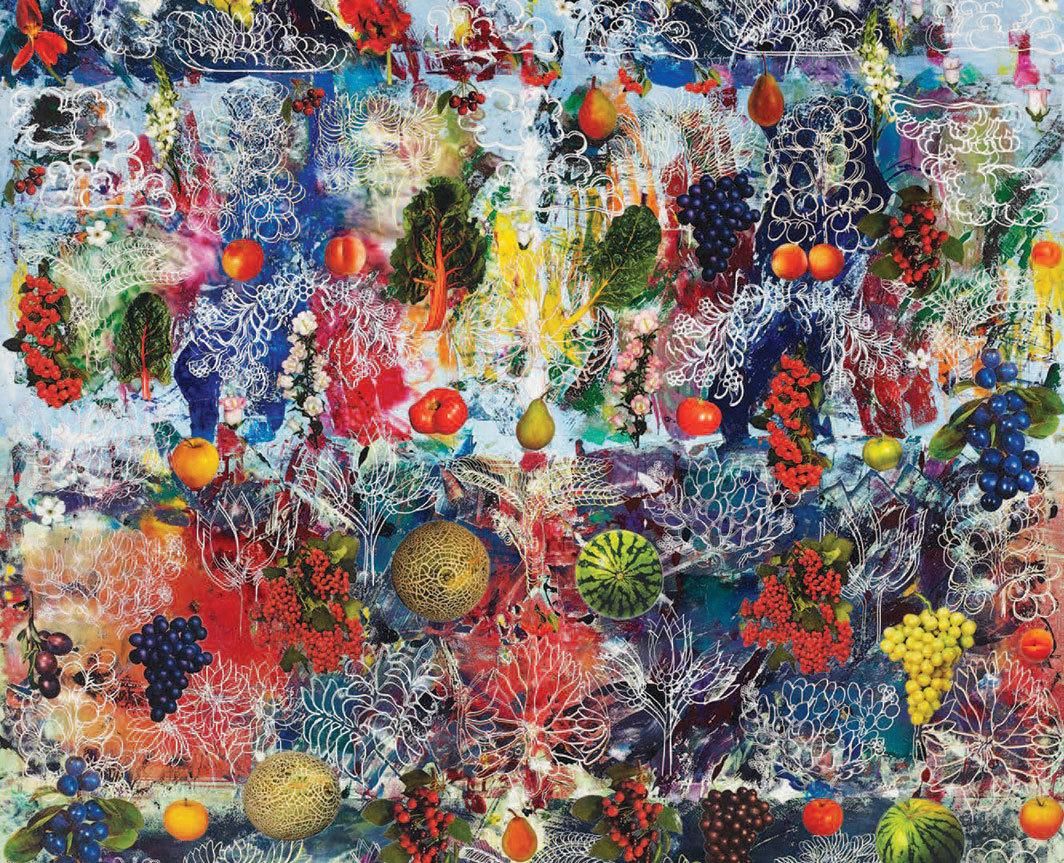
The trip out to the farm was slower than usual. First one had to get the grandmother to the elevator, down the majestic and cruelly numerous steps from the lobby to the street. Then, as they were reaching the outskirts of Cairo, a traffic jam was created by a horse unable to pull his cart up an incline. When finally they reached the pocked and bumpy road leading to the farm, they were preceded by heaped garbage carts pulled by donkeys and driven by children perched on top of the garbage. But when they turned off this road it suddenly became country, green with palms, women washing clothes along a canal.
The gates to the property were unlocked as were the gates to the garden of the villa. Servants ran out, rickety lawn chairs were placed on the grass, tea was ordered. Nadia accompanied her grandmother along a stone pathway to a chair, her grandmother leaning heavily against her. As always, it was quiet and cool here. Some ancestor had shortened the garden wall in one corner to reveal a vista of rippling green alfalfa fields and swaying palms. Peasants on donkeys could look into the garden at that point. They provided a moving tableau for those looking out.
Nadia told her grandmother and Adnan that she was going for a walk and bounded over the fence. There was the canal with the bridge and the whistling tree. Bordering the canal on both sides were footpaths and across the canal, fields dotted with ibis, considered inviolate since pharonic times. Off to the left were the pigeon coops, resembling the turrets of a miniature castle. To the right a young woman walked along the canal footpath, her loose, brilliantly colored shift molded against her body by the breezes. She walked upright, a clay water jug balanced on her head. Nadia started to make her way along the footpath to the left.
Adnan watched her walk away. He hoped that being at the farm would calm her. When she was younger she had urged him to take over the farm, reconstruct the villa. She had pointed out the rich, dark topsoil to him, saying it was well known that one could grow anything in it. He had carefully explained that the revenue from the land, now rented out to peasants, would not pay for the renovation of the villa. In any case, the ownership of the villa and adjoining workers’ quarters was being disputed by several relatives who wouldn’t spend a piaster on the grounds. They didn’t even subsidize the tea and sugar they demanded when they came to sit in the garden and left carrying baskets of fruit.
It was her father who paid for the man who guarded the orchard. He paid for the medicine needed by the aging, ailing caretaker, who had seen better times. He couldn’t be expected to sink money into a disputed property. But surely, Nadia had insisted, there was room for negotiation; with the relatives, with the peasants. How about preserving his heritage, or honoring the care with which someone had planted the twin royal palms, laid down the tiles around the fountain in the Andalusian style courtyard, built the large aviary. Yes, he would answer, but that was a different time and he wasn’t going to throw his money away in quicksand for sentimental reasons.
Still, her father had to admit, earlier it might have been possible to buy out other interests. Now it was impossible. Earlier it might have been possible to restore the villa. Now it was literally sinking. Amazing how quickly something could fall into ruin. He didn’t mind the tiles buckling because of tree roots, or the birdcage empty of exotic birds. But he felt helpless in front of the mildewing living room wall.
Adnan wondered how Nadia would have felt if she had seen the farm in its heyday, with his uncle still alive. The villa had had crackling fires in the chimneys, shining parquet floors and elegant furniture. His uncle had set up a modern clinic for the peasants. He had imported Dutch cows. The garden and orchard had been laid out in consultation with an agrarian engineer. When Nadia was a baby and Adnan had been visiting with her and his wife, his uncle had given her a jasmine garland. But she was too young to remember.
Nadia would be coming back for tea soon. Adnan resolved to find a way of keeping her out of the villa, one room of which was full of chicks — the project of some relative. Under the overhang in the inner courtyard another relative, an old woman, sat on a straw mat with a clay water jug at hand.
When they got back to the apartment, Ustaz Mounir was waiting for them. He was sipping Arabic coffee in the harshly lit living room. He rose to his feet when they entered. He looked the same to Nadia, ageless, his smile as wide as ever and his body as thin. She couldn’t tell if he was wearing the same grey suit of earlier years or another one. Her father retired to the study and grandmother to her bedroom. Nadia took Ustaz Mounir out onto the balcony. The first few minutes were spent exchanging niceties. They were clearly delighted to see each other. Ustaz Mounir then remarked on the splendid view. Nadia brought a chilled bottle of white wine onto the balcony and poured out two glasses.
Ustaz Mounir: “Are you back in Egypt for good?”
Nadia: “No, in fact I think this will be the last time that I come to Egypt.”
Ustaz Mounir sat upright in his bamboo chair: “God give me strength. What a thing to say. You who have so much here; people who love you and are willing to give you everything.” Ustaz Mounir squinted into the living room where the chandelier glow rendered the Louis Farouk furniture gaudier than necessary.
Nadia: “Every time I come here it is dirtier.”
Ustaz Mounir: “It is dirty everywhere.”
Nadia: “No, not to this extent.”
Ustaz Mounir: “If you were married, with children, you would be happy here.”
Nadia: “What do you expect me to do Ustaz Mounir, live in this apartment and have children? And then what? Anyway, you never had children.”
Ustaz Mounir: “I didn’t find the woman who suited me.”
Nadia: “Ustaz Mounir, when my grandmother dies she will be the last relative I can stand, and if anything happens to my father, the relatives will descend on me like vultures because I have no brother.”
Ustaz Mounir looked back into the living room, at the tapestry worked by the grandmother, at the dark portraits. “Your husband will protect you.”
“Marriage with an Egyptian would be like a business contract. I cannot live here, Ustaz Mounir. It upsets me to even visit.”
Ustaz Mounir looked down at his veined hands, at a loss for words. Then he looked up, or rather perked up and with a wide sweep of his arm at the river said:
“Nadia, look at this view. Where else in the world can you find it? Egypt is the gift of the Nile and Egypt is…”
Nadia interrupted him: “I know, Ustaz Mounir, Egypt is the suffering mother of the whole world.”



